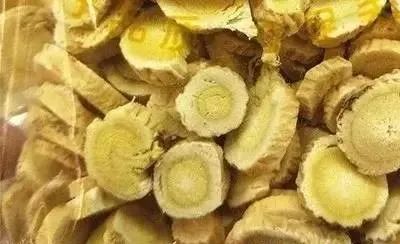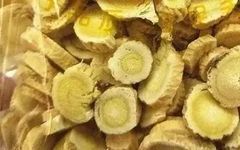Astragalus, a herb that may be unfamiliar to many, is actually a traditional Chinese medicinal material. Particularly, its efficacy when brewed in water is extensive. Its primary pharmacological action is to “tonify Qi and stabilize the exterior,” and it can also “promote diuresis” and “expel toxins to promote tissue regeneration.” So, what are the benefits of drinking Astragalus tea? Let’s take a look!

1. Tonify Qi and Nourish Blood
Astragalus, once ingested, has the effect of tonifying Qi and nourishing blood, effectively treating conditions such as fatigue, Qi deficiency, blood deficiency, and general weakness, thereby promoting recovery to health.
2. Lower Blood Pressure
Scientific studies have found that Astragalus can effectively lower blood pressure, particularly by reducing the formation of blood clots, and it has a bidirectional regulatory effect on blood sugar levels. Astragalus also has the ability to dilate blood vessels, which enhances blood circulation and provides good therapeutic effects for chronic ulcers, skin issues, and various blood disorders.
3. Stabilize the Exterior
In TCM, Astragalus is believed to have the effect of stabilizing the exterior and can also promote tissue regeneration, showing good efficacy for conditions such as edema. If one experiences night sweats, edema, or chronic non-healing wounds, drinking Astragalus tea can help the body recover quickly.
Medicinal Value of Astragalus
1. Deficiency Sweating
Commonly used for spontaneous sweating due to deficiency. If the exterior Qi is not firm and sweating occurs, Astragalus can be combined with Bai Zhu (White Atractylodes) and Fang Feng (Siler) for treatment, which is effective with prolonged use. A formula like Yu Ping Feng San (Jade Windscreen Powder) can be used; it can also be combined with Fu Xiao Mai (Floating Wheat) and Ma Huang Gen (Ephedra Root).

2. Yin Deficiency Night Sweating
Can be used with Sheng Di (Rehmannia) and Mai Dong (Ophiopogon) for Yin-nourishing herbs.
3. Acute Nephritis Edema
Used for deficiency-type edema caused by insufficient Yang Qi, often combined with Fang Ji (Stephania) and Fu Ling (Poria) and Bai Zhu (White Atractylodes), as in the formula Fang Ji Huang Qi Tang (Stephania and Astragalus Decoction).
4. Chronic Nephritis Edema
Often used with Dang Shen (Codonopsis), Bai Zhu (White Atractylodes), and Fu Ling (Poria) for spleen and kidney deficiency. It is effective for ulcers that do not heal and promote healing and localization. For carbuncles that do not form heads, it is often combined with Chuan Shan Jia (Pangolin), Zao Jiao Ci (Soapberry Thorn), Dang Gui (Angelica), and Chuan Xiong (Szechuan Lovage).
6. Ulcers that do not heal
Have the effect of promoting tissue regeneration and healing, often combined with Jin Hua (Honeysuckle), Zao Jiao Ci (Soapberry Thorn), and Di Ding (Dandelion). For purulent fluid cleansing, it can be used with Dang Shen (Codonopsis) and Rou Gui (Cinnamon).
Contraindications for Astragalus
1. Patients with kidney Yin deficiency, damp-heat, or severe heat toxin should avoid Astragalus tea, as it may worsen their condition instead of promoting recovery. Such patients should consider using Huang Lian (Coptis), Da Huang (Rhubarb), Bai Jiang Cao (Patrinia), and Zhi Zi (Gardenia) instead.
2. Patients with pulmonary tuberculosis, presenting symptoms such as hemoptysis, dry mouth, and fever, should not use Astragalus tea alone and should instead combine it with appropriate herbs based on their specific condition.

3. Women during menstruation should also avoid Astragalus tea, as it may adversely affect their menstrual cycle and health.
4. Patients with colds and fevers should not take Astragalus, as it is not conducive to reducing fever.
5. Pregnant women should be particularly cautious when taking Astragalus, as it may lead to miscarriage and harm both the fetus and the mother, especially in late pregnancy.
Side Effects of Drinking Astragalus Tea
1. The most common side effect is the rapid onset of “heat” symptoms, such as facial redness, irritability, poor sleep or insomnia, sore throat, elevated blood pressure, or dizziness, which may even worsen the condition.
2. Clinically, it is dangerous for individuals to frequently use Astragalus alone or in large doses at once, as this can lead to unnecessary health issues or exacerbate existing conditions. When using Astragalus, it is advisable to start with a small amount and gradually increase while monitoring for any signs of heat or worsening of existing conditions. If symptoms such as fatigue, excessive sweating, or shortness of breath improve without side effects, the dosage can be increased.

3. A safer approach is to first use Dang Shen (Codonopsis), which is effective and has no side effects, before adding or switching to Astragalus, using a gradual increase in dosage to a level that the body can tolerate without side effects. The safest method is to use it in a formula.
Conclusion: Although Astragalus is a valuable medicinal herb, it is not without its risks. It has contraindications and potential side effects. Therefore, it is recommended to follow a doctor’s guidance when purchasing and to consider whether one’s constitution is suitable for this type of herbal material.
More exciting recommendations:
Contraindications for Moxibustion Foot Baths
Is it better to dry mugwort in the sun or in the shade? The effects and functions of mugwort leaves
A herbal tea recipe to help relieve lower back and leg pain on rainy days, using just two herbs
What foods pair well with Astragalus? These six foods are a perfect match.
The “lifesaving medicine” for liver cirrhosis has been found; keep it at home to eliminate liver disease troubles in two weeks!

